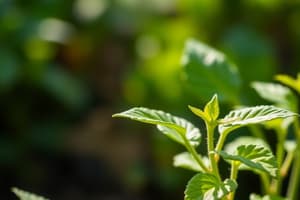Podcast
Questions and Answers
Explain the biological processes, characteristics, and behaviors exhibited by plants.
Explain the biological processes, characteristics, and behaviors exhibited by plants.
Plant life refers to the various processes such as growth, reproduction, metabolism, response to stimuli, and interactions within their environment exhibited by plants.
What is the significance of photosynthesis for plant survival?
What is the significance of photosynthesis for plant survival?
Photosynthesis is crucial for plant survival as it allows them to convert sunlight into energy, which is essential for their growth and development.
Discuss the fundamental role of plants in ecosystems.
Discuss the fundamental role of plants in ecosystems.
Plants play a fundamental role in ecosystems by providing oxygen, food, and habitats for various organisms, thus contributing to the overall balance and sustainability of the ecosystem.
Flashcards are hidden until you start studying
Study Notes
Biological Processes and Characteristics of Plants
- Plants are autotrophic organisms, meaning they produce their own food through photosynthesis
- They have the ability to adapt to their environment through mechanisms such as tropisms (e.g., phototropism, geotropism)
- Plants exhibit various growth patterns, including primary and secondary growth, and respond to environmental stimuli through hormones and signals
- They have a range of structural features, including roots, stems, leaves, and flowers, each with specific functions
Photosynthesis and Plant Survival
- Photosynthesis is the process by which plants, algae, and some bacteria convert light energy from the sun into chemical energy in the form of organic compounds
- This process is essential for plant survival, as it provides the energy and organic compounds needed for growth, development, and maintenance
- Photosynthesis occurs in specialized organelles called chloroplasts, which contain the pigment chlorophyll
- The overall equation for photosynthesis is: 6 CO2 + 6 H2O + light energy → C6H12O6 (glucose) + 6 O2
Fundamental Role of Plants in Ecosystems
- Plants are the primary producers of ecosystems, providing energy and organic compounds for herbivores and omnivores
- They play a crucial role in the carbon cycle, absorbing CO2 from the atmosphere and releasing O2 as a byproduct of photosynthesis
- Plants help to regulate the water cycle, with transpiration accounting for a significant portion of evapotranspiration
- They provide habitat and shelter for a wide range of organisms, from insects to larger animals, and support complex food webs
Studying That Suits You
Use AI to generate personalized quizzes and flashcards to suit your learning preferences.




